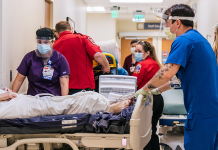The COVID-19 Delta Variant is rapidly spreading around the world, prompting lockdowns in some countries where there had previously been few reported COVID-19 cases. This variant, which was discovered in India, is said to be more contagious than the British variant (now known as alpha). So, what exactly is COVID-19’s delta variant, and what do we need to know about it right now? We enlisted the assistance of experts to shed some light on the matter.
What Is COVID-19 Delta Variant?
The COVID-19 Delta Variant virus has first appeared in India and now spread to over 80 countries and is quickly becoming the dominant version of the virus. The Delta virus has dethroned the highly transmissible alpha variant in many countries like the United Kingdom and it was first identified as the most common form of the virus in the United Kingdom. Fever, headache, sore throat, and runny nose are the most common symptoms of the Delta variant.
Who Is At the Risk of Contracting COVID-19 Delta Variant?
According to the most recent research, the COVID-19 delta variant poses the greatest risk to unvaccinated people or only partially vaccinated people.
According to the Centers for Disease Control and Prevention (CDC), nearly 78 percent of people over the age of 65 are immunized. Because many older people and those with underlying conditions are already immunized, the virus is primarily spreading among those who are not patients in their twenties, thirties, and forties who are either unvaccinated or only partially vaccinated.
Delta is thought to be responsible for 26.1 percent of all cases in the United States. Every two weeks, COVID-19 delta variant and delta plus variant prevalence doubles. Focusing on states with low vaccination rates, such as Missouri and Wyoming, reveals that delta is already causing the majority of infections in some places. On July 1, the Biden administration announced that teams of experts armed with testing supplies and therapeutics would be dispatched to hotspots in the United States to combat delta outbreaks.
Vaccines for COVID-19 Delta Variant
A single dose of either AstraZeneca’s (not currently approved in the US) or Pfizer’s vaccines reduced the risk of developing symptoms due to the delta variant by 33%. The Pfizer/BioNTech vaccine was 88 percent effective after two doses against symptomatic disease caused by the delta variant.
Pfizer BioNTech’s unexpected announcement is to seek approval for a booster shot in the United States. This announcement has raised new concerns among the general public about the efficacy of COVID-19 vaccines against the highly contagious Delta variant.
Pfizer plans to seek approval for a booster shot in the coming weeks, citing the possibility that protection against the coronavirus will wane six to twelve months after full immunization with the current two-shot regimen.


















